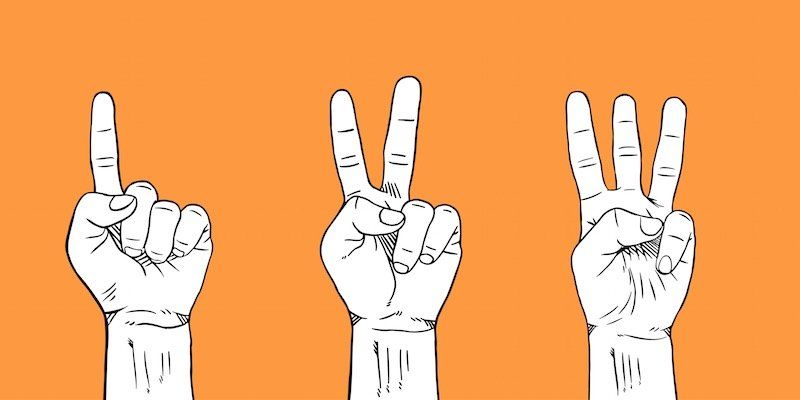Be More Productive with the Rule of 3
This article was originally published on LinkedIn by Chris Bailey on Oct 28th 2015. Chris is a self-proclaimed Jedi Master at A Life of Productivity where he blogs about being productive.
For Some Strange Reason, Our Brain is Wired to Think in Threes.
As kids, we grow up immersed in stories that involve threes: Goldilocks and the Three Bears, the Three Blind Mice, and the Three Little Pigs. In high school, when we’re forced to dissect books like The Three Musketeers for English class, we break down the plot into three parts—the beginning, middle, and end. When we become adults, we observe that good things happen in threes, and that the “third time’s the charm.” The Olympics awards three medals for each event—gold, silver and bronze… Well, you get the idea.
There is something oddly attractive about the number three which can help you a lot as far as productivity is concerned.
Good #ProductivityHacks are hard to come by. There’s no shortage of advice out there, but after you read it, you have to make all that time back, presumably by using the very tactics you’re reading about. If the productivity hacks don’t help you earn that time back—and then some—you’re really just looking at productivity porn.
Over the last decade, I’ve experimented with countless productivity hacks. Some of them have worked, many of them haven’t. But the one productivity hack that has produced the greatest returns for me is the Rule of 3.
Here’s the Rule of 3:
- At the start of every morning, fast-forward to the end of the day and ask: When the day is done, what three things will I want to have accomplished?
- Do the same at the start of every week.
That’s it.
The rule is simple, but deceptively so. I’ve found that the Rule of 3 helps me work more efficiently and earn back more time than any other productivity hack:
- It fits with the way we think. For some reason that I haven’t been able to figure out, from childhood our brain is wired to think in threes.
- It’s hard to keep in mind what’s important. While you won’t remember a whole laundry list of things to do when you’re in the trenches, you’ll remember your three intentions.
- You decide what you don’t By picking the three main things you want to accomplish that day, you have taken the time to separate what’s important from what isn’t.
- It only takes a minute. For every minute you spend using the Rule of 3, you gain back at least 10 minutes of productivity.
- It helps you work more deliberately. Productivity is the process of working more deliberately, with intention. The Rule of 3 helps you to step back, determine what’s important, and then reflect throughout the day on whether you’re spending your time on the right things. The intention behind your actions is like the shaft behind an arrowhead. I haven’t found a better rule for setting intentions every day.
- The rule lets you consider your limits. Each day you only have so much time, attention, and energy. Productivity is a process of understanding your constraints. The Rule of 3 helps you think about how much want to accomplish, and then, over time adjust to how much you actually can accomplish once you better understand your limits. At first, I overestimated how much I could get done when defining my three things; later I underestimated what I was capable of. Finally I settled into an equilibrium where I understood how much I could do every day. That awareness has become, as Steve Jobs might say, insanely valuable.
As you might expect with something so simple, the rule is ageless. It has been talked about by everyone from Leo Babauta of Zen Habits to Gina Trapani of Lifehacker. I first discovered the rule from J.D. Meier, the author of Getting Results the Agile Way . J.D. is Microsoft’s Director of Business Programs, where he and his team use the rule every day. When I asked J.D. why he thought the rule is so powerful, he said, “I originally focused on the Rule of 3 because when my manager asked me what the team achieved for the week, he didn’t want a laundry list. He was willing to listen to three compelling outcomes.” J.D. found that “three things was very easy to keep top of mind, without having to write it down or look it up.”
I’ve found the exact same thing.
When your aim is to work more deliberately and accomplish more over the day, the Rule of 3 is in a league of its own.
Chris Bailey blogs about productivity over at A Life of Productivity . He’s the author of the forthcoming book, The Productivity Project: Accomplishing More by Managing Your Time, Attention, and Energy , which will be published in January 2015 by Crown Business.
Katherine Martin
Origin Mortgages
Phone: 1-604-454-0843
Email: kmartin@planmymortgage.ca
Fax: 1-604-454-0842
RECENT POSTS






